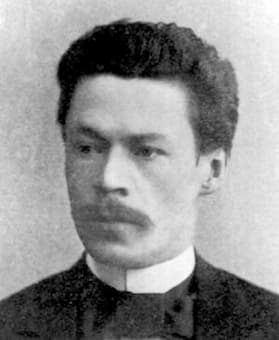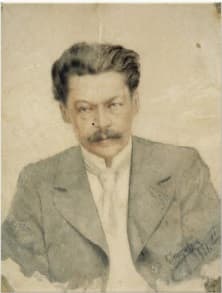
Anton Arensky
In his Memoirs, Rimsky-Korsakov was decidedly unkind to his student Anton Arensky. He accused him of having been an alcoholic and gamblers, and that his death by consumption was the final and just result. “By the nature of his talents and his tastes as composer he was the closest approximation to Anton Rubinstein, but he was inferior in the force of talent for composition… He will be soon forgotten.” As a teacher, Rimsky-Korsakov had nothing but praise for Arensky, and he even engaged him to work on various orchestration projects of his own works. So what actually happened in the relationship to warrant such a complete turnabout? In a way, Arensky was thrown into the cauldron of discussion of how to separate the vague blend between cosmopolitan and nationalist artistic expression. While the theories of musical composition were considered a product from Western Europe, a strong interest in local folk music was growing amongst Russian intelligentsia. Arensky refused to explicitly join the strongly nationalist path advocated by Rimsky-Korsakov and the Mighty Handful, and instead suggested “Russian nationalism and cosmopolitanism in music could cohabite without major antagonism.”
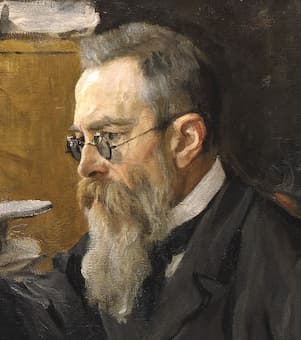
Nikolai Rimsky-Korsakov
Igor Stravinsky, who subsequently also became a student of Rimsky-Korsakov, considered the Arensky criticism “unjustifiably harsh and unkind.” He writes, “Rimsky-Korsakov criticized Arensky’s music captiously and unnecessarily, and the comment that he did very little, and that little will soon be forgotten, was cruel… He meant something to me also by the mere fact of his being a direct personal link with Tchaikovsky.” Undoubtedly, that close link between Arensky and Tchaikovsky—they had been colleagues at the Moscow Conservatory—did not sit well with the Rimsky-Korsakov crowd. Tchaikovsky was undoubtedly the greatest influence on Arensky’s musical compositions. It is no accident that one of Arensky’s best-known compositions is his Variations on a Theme of Tchaikovsky, Op. 35a, which uses the melody of “Legend,” the No. 5 of Tchaikovsky’s Sixteen Songs for Children, Op. 54. The lyrical nature of Tchaikovsky’s theme is grandly projected, and the tribute proved extremely popular. It has been rightfully suggested that Arensky’s music “bridged the gap between Tchaikovsky and Rachmaninoff.”
Anton Arensky: 12 Etudes, Op. 74 (Adam Neiman, piano)
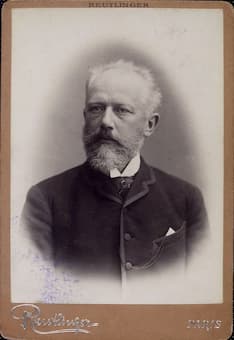
Pyotr Ilyich Tchaikovsky
Arensky’s “ready flow of lyrical, often sentimental melody, and his easy command of keyboard textures equipped him splendidly to be a composer of songs in the romance manner that dominated Russian song in the 19th century. Similarly, he could produce beautifully turned keyboard miniatures.” As such, Arensky was clearly at odds with the instructions uttered by Glinka, the “Father of Russian Music.” Glinka had suggested that Russian music should be distinct from the Western canon, and that the composer should merely take on the role of arranger. Aresnky didn’t rebel against that idea completely, as his integrated Russian folklore, tunes, literature and legends. He also drew on ancient epic song in his Requiem and imperial anthems. However, Arensky was also drawn to symphonic form, which he mastered with confidence and great coherence. As always, Arensky provides “dramatic assertive music with lyrical beauty.”
Anton Arensky: Symphony No. 2 in A Major, Op. 22 (BBC Philharmonic Orchestra; Vassily Sinaisky, cond.)
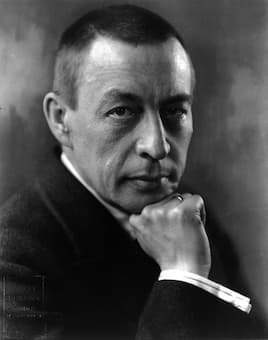
Sergei Rachmaninoff
The Russian writer Alexander Belyaev strongly believed that Arensky “occupies a great place in the history of Russian music, far greater, indeed, than most people are aware, and the full significance of his contribution is not yet generally realized.” To the chagrin of his teacher Rimsky-Korsakov, Arensky did not become a leader of the nationalist movement in music, but followed the compositional trends of his time. He did not adopt a clear-cut concept of philosophy, but as Richard Taruskin has suggested, Russian music for today’s researchers “is no longer judged exclusively in terms of its national character.” The ill-conceived notion to turn the Russian Empire into a national Russian State was doomed to failure, and it quickly led to the Revolution of 1917. “The ideal of a pure school of Russian composition was also rapidly abandoned,” but musical nationalism continued to echo throughout the 20th century. In that sense, Arensky was actually, albeit unbeknownst, a visionary and his musical and artistic legacy is decidedly in need of re-evaluation.
For more of the best in classical music, sign up to our E-Newsletter

